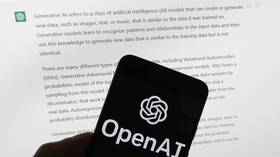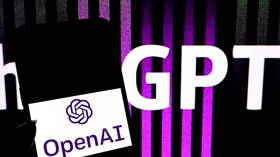EU goes after ChatGPT

The European Data Protection Board said on Thursday that it will help member countries coordinate activities regarding ChatGPT, an American-developed AI chatbot that Italy has already banned over privacy violations.
“The EDPB decided to launch a dedicated task force to foster cooperation and to exchange information on possible enforcement actions conducted by data protection authorities,” the agency said, according to AFP.
Italy banned ChatGPT last month, saying it allegedly violated EU privacy laws. Since then, Spain’s data protection agency AEPD has opened a probe into ChatGPT’s maker OpenAI, saying that development of artificial intelligence “must be compatible with personal rights and freedoms.” Germany has said it could do the same thing “in principle,” but hasn’t made a move against ChatGPT yet.
On Thursday, the French regulator CNIL said it had also opened a case, after receiving five complaints about the chatbot. One of them came from Eric Bothorel, a member of parliament from President Emmanuel Macron’s LREM party, who said the chatbot had “invented” details of his life such as birth date and job history.
The EU’s GDPR data protection law requires online services to provide accurate personal information. In 2021, the bloc proposed stringent regulations regarding AI development.
Last week, US law scholar Jonathan Turley revealed that the chatbot had invented a news article accusing him of sexual harassment of students during a trip to Alaska. No such article ever existed, Turley had never gone to Alaska, and the chatbot identified the wrong university as his supposed employer.
OpenAI, the Microsoft-backed company behind ChatGPT, has told AFP that it was “committed to protecting people's privacy” and believed that the chatbot was fully compliant with EU laws. After Italy’s ban, OpenAI “voluntarily geo-blocked” its program’s access to Italy.
The first publicly available iteration of ChatGPT launched in November 2022, and the copy it generated based on user prompts quickly caused an uproar from academia to journalism. According to OpenAI, its latest iteration, GPT-4, “exhibits human-level performance on various professional and academic benchmarks,” including top scores on the US bar exam and SAT university entrance tests.
OpenAI CEO Sam Altman told ABC News last month that the AI will “eliminate a lot of current jobs,” and that he was concerned it could be used for “large-scale disinformation” as well as “offensive cyber-attacks.” However, Altman insisted that GPT-4 is still “very much” under human control.














